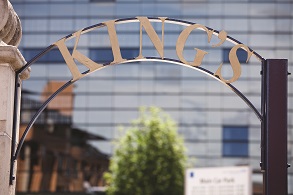Feature / A king-size challenge
King’s College Hospital in London has a significant efficiency task ahead of it and it has identified a fundamental transformation of the trust and its finance function as a key foundation for success. Steve Brown reports
 King’s College Hospital NHS Foundation Trust in south-east London has a significant underlying deficit and a seemingly heroic control total. Like other providers, keeping spending within this control total is key to the release of vital sustainability and transformation funding.
King’s College Hospital NHS Foundation Trust in south-east London has a significant underlying deficit and a seemingly heroic control total. Like other providers, keeping spending within this control total is key to the release of vital sustainability and transformation funding.
Perhaps where King’s differs from other providers is in the sheer scale of the challenge – it will require unprecedented levels of savings of £72.5m this year. The trust recognises it needs a step change in financial performance, and a major transformation of its finance department will be at the heart of its improvement programme.
King’s College Hospital is a big trust, with a turnover of £1.1bn. It has an international reputation for good clinical services, although an inspection by the Care Quality Commission last year returned a ‘requires improvement’ rating overall. It also has significant challenges in restoring required access standards, both on the four-hour wait in accident and emergency and on referral to treatment (RTT) targets.
Its size is matched by the scale of its financial challenge and its position has deteriorated significantly in recent years. A reported surplus in 2013/14 of £66m perhaps overstated its financial health. The acquisition of the Princess Royal University Hospital had improved the reported position, but its deficit before exceptional items was a relatively modest (by current standards) £3.1m – £5m off a target surplus of £2m.
In 2014/15, the problems became clearer, with an operating deficit of £16m and an overall deficit, after financing costs, of £52m. This increased again last year to a bottom line of just over a £65m deficit. Even this position (broadly on plan) relied on one-off mitigating actions, including clinical commissioning group sustainability funding and capital to revenue transfers (as called for by NHS Improvement).
‘The underlying deficit is £118m – a run rate deficit of about £10m a month,’ says Colin Gentile, the trust’s chief finance officer. The timing of the transfer of the Princess Royal in October 2013 would appear to coincide with the downturn in financial performance. But Mr Gentile doesn’t believe this fully explains the current financial position. He and the current executive team are determined to establish a firmer grip on the finances and governance as the trust moves forward – but it will be a challenge to keep out of the newly defined special measures regime.
Changes have been introduced, with revised business case and business planning processes, and a whiteboard in the finance director’s office spotlights the big issues facing the trust. Mr Gentile says it is a large board. The finance function will be key to establishing a firmer grip, and people have risen to the challenge. But it needs to change – a view reinforced by an independent review undertaken by consultancy RSM. Its overall conclusion was that the function is ‘sub-optimal’, although structure, multiple systems and an over-reliance on manual processes (often required because a lack of purchase orders or poor-quality feeder information) are at least partly responsible.
‘The report found a lot of strengths – its day-to-day operational financial control is good and the numbers it produces are highly accurate, but its focus is in the wrong place,’ says Mr Gentile. ‘This view is backed up by external and internal audit opinions.’
A modern finance team should typically be spending 65% of its time on strategic, value-adding roles (such as providing analysis and support to frontline teams) and just 35% on transactional activities, according to the RSM report. But it found the King’s team has these proportions turned on their head, with 75% of work being transactional.
‘In short, we need to develop more of a business partnering model,’ Mr Gentile says. ‘The basic numbers are credible and reliable but it takes too long to generate them and we are not adding enough value back to the business.’
This chimes with a customer survey held as part of the review. While finance service users typically saw the team as ‘ambitious and hard-working’, they also noted a number of ‘frustrations, pain points and blockers’. Some of the key identified problems were around:
- Reporting - A lack of analysis that would enable forward-looking decisions
- Timeliness - Information requests received late so that decisions were based on outdated information
- Training non-finance staff - This rarely happens, inhibiting relationships
- Processes - A reliance on manual processes leads to inefficiency and lack of transparency.
While the report clearly included some criticism of current practice, it also pointed out that the cost of the function was well below the average (0.63% of turnover compared with 1.06%) and it also had fewer staff and a lower average grade than median benchmarks.
Mr Gentile says this makes a good argument for further investment in the function downstream, but that the existing 110-strong team is already rising to the challenge.
Transformation plan
The report was shared with staff and a financial transformation plan was launched in July. This year-long work programme aims to be highly participative, with staff getting involved to redesign inefficient processes identified in the review. ‘The energy in the room each time we meet is amazing,’ he says, ‘and we are developing a governance process to ensure that changes happen and processes work as intended.
‘There will be a lot of simple changes we can make – we have a quick-wins workstream. These changes will help the accuracy and, more importantly, the timeliness and format of the information to support end users. There is a lot that can be done.’
The trust has both patient-level costing and service line 
reporting systems in place, but the focus has been on
producing rather than using data. ‘One of the issues is
that we are not using these tools in the trust as we should
to help us develop the organisation,’ says Mr Gentile (right). ‘So one of my objectives is to kick life into these initiatives – get clinicians engaged, refine the data and start using it to inform change.’
He says recent workshops with consultants have convinced him that they are enthusiastic to get more financial analysis to support service development.
Away from the finance department, NHS Improvement has also helped in supporting the trust to undertake a whole trust transformation programme, giving the green light for getting in some consultancy support. This will see three clean-sheet redesigns for bariatric services, emergency care and theatres. ‘The core idea is to ask: “If we weren’t starting from here, what would services look like?”,’ Mr Gentile says.
An improvement academy is being set up to train staff in lean skills, with a first crop of yellow belts (lean qualifications) qualifying over the summer. ‘The idea is to help change the whole culture and move towards an attitude of continuous improvement.’
Revised pathways emerging from these redesigns will be underpinned by the trust’s electronic patient record, with the trust looking to introduce more routine clinical decision-making support tools. ‘This will help us analyse variations in treatment patterns and decision-making and move towards and maintain world-class services,’ he says.
Mr Gentile says the changes being made across the organisation and within finance are not being driven by the wider financial challenges – they would be the right things to do whatever the economic situation. They will also contribute to reducing the current financial gap and help deliver sustainable services over the medium to longer term. But there is no doubt that they add to the trust’s burden in the short term. ‘This is difficult and undeniably a big challenge,’ says Mr Gentile.
The control total set for King’s as part of July’s financial reset requires the trust to make a deficit of no more than £1.6m. The basic maths is that the £118m underlying deficit is being covered by the £72.5m savings programme, £30m in sustainability and transformation funding and then some benefit from the tariff and some margin on extra work when clearing RTT and other activity. After three months, the trust had planned to be showing a year-to-date deficit of £19.6m, with the savings programme profiled to have an increasing impact as the year goes on. But figures for the end of June showed the trust off trajectory by £5.3m.
The position looks even worse according to central returns to NHS Improvement. The spreadsheet will not allow the trust to accrue for the receipt of its first quarter’s STF funding (£7.5m) while the trust is off its required performance trajectory.
‘The danger is that this creates an unvirtuous circle,’ says Mr Gentile – trust staff feel that, despite their best efforts, they are nowhere near the required financial position. CIP slippage is an issue (£1.8m) but the biggest problem has been failing to hit activity targets due to operational problems – a combination of the junior doctors’ strike, a norovirus outbreak at the Princess Royal and a backlog of repairs in theatres. ‘We are completely focused on the delivery of the CIP, but we also need to deliver the activity in our plan at a cost that allows us to make a margin,’ he says.
Teams have had to submit business cases to access funds for any commercial opportunity, including growth activity. But with agency costs still rising in some specialties – especially for medical staff – many business cases for delivering additional activity have been identifying a margin below the amount built into the plan. While these may still make a contribution to overheads and help the overall financial position, they create an additional cost pressure in meeting the planned outturn.
Transparency is key
It has been important to operate with complete transparency. ‘The position isn’t easy but what the board like is that they are sighted on all of this,’ says Mr Gentile. Newly designed and clear finance reports are available on the trust’s website, and the trust has been frank with NHS Improvement about its position and the risks in meeting the control total. ‘The risks are very explicit and on the record,’ he says.
Mr Gentile says month four figures will be crucial in ‘gaining a clearer view of the cost improvement programme’. He then plans to undertake a risk-based projection of the outturn position and this will be underpinned by a review of the trust’s capacity plan.
A broader restructuring programme is looking to get more wholesale clinical involvement in financial and service improvement and to strengthen the operational function. There has also been a move to be clear about objectives and accountabilities – all executives, for example, now have a performance contract with the chief executive.
Mr Gentile is convinced the trust is on the right track. ‘Everybody is doing the right thing and there are a lot of good people doing a lot of hard work in this trust. It is very focused,’ he says. But the financial context is very challenging and it will take time for the changes to have the required impact. In the meantime, Mr Gentile says, the executive team ‘will carry on working hard, trying to take the right approach’.
Related content
We are excited to bring you a fun packed Eastern Branch Conference in 2025 over three days.
This event is for those that will benefit from an overview of costing in the NHS or those new to costing and will cover why we cost and the processes.